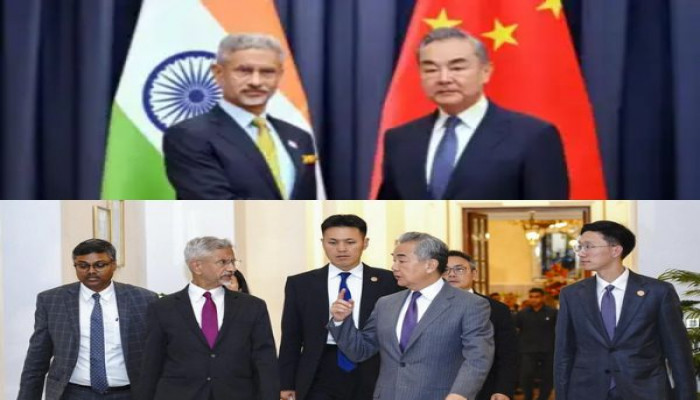‘No change in our position on Taiwan’: India rebuts China's Jaishankar claim
- In Reports
- 07:02 PM, Aug 19, 2025
- Myind Staff
Chinese Foreign Minister Wang Yi said on Monday that India and China must see each other as "partners" rather than "adversaries or threats" as he arrived in Delhi for a two day visit.
Yi met Indian Foreign Minister S Jaishankar, which was only the second such meeting between the two sides since 2020 when deadly clashes in the Galwan valley in Ladakh, caused a complete breakdown in relations between the two countries.
Relations were now on a "positive trend" towards cooperation, Yi said ahead of a meeting with Indian Prime Minister Narendra Modi on Tuesday.
Jaishankar said that India and China were trying to "move ahead from a difficult period in our ties".
The two leaders discussed several bilateral issues including trade, pilgrimages and river data sharing.
On Tuesday, Yi also met India’s National Security Advisor Ajit Doval for continued talks on resolving the border dispute between the two countries.
"We are happy to share that stability has now been restored at the borders," Yi said during the delegation-level meeting with Doval.
"The setbacks that we faced in the last few years were not in our interest," he said.
Yi’s visit was seen as the latest indication of an improvement in relations between the nuclear-armed neighbours.
India and China had agreed on patrolling arrangements to ease tensions along the disputed Himalayan border in October last year.
Since then, both sides have taken steps to normalise ties, including China allowing Indian pilgrims to Kailash Mansarovar. India had also restarted visa services for Chinese tourists and agreed to reopen talks to allow border trade through designated passes.
There were also reports that direct flights between the two countries would resume this year.
Yi’s meetings were expected to prepare the ground for Modi’s first visit to China in seven years later this month to attend the summit of the Shanghai Cooperation Organisation (SCO), a regional security bloc.
Reports suggested PM Modi might also hold bilateral talks with Chinese President Xi Jinping but neither side had confirmed this.
This improvement in ties came at a time when India’s relationship with the United States was worsening.
Earlier this month, US President Donald Trump imposed an additional 25 per cent tariff on Indian imports for buying oil and weapons from Russia, raising the total tariffs to 50 per cent, which was the highest in Asia.
On Monday, White House Trade Advisor Peter Navarro wrote in The Financial Times, accusing India of "cozying up to both Russia and China".
"India acts as a global clearinghouse for Russian oil, converting embargoed crude into high-value exports while giving Moscow the dollars it needs," Navarro wrote.
"If India wants to be treated as a strategic partner of the U.S., it needs to start acting like one," he said.
After his meeting with Yi on Monday, Jaishankar said that their talks would also cover international developments.
"We seek a fair, balanced and multipolar world order, including a multipolar Asia," Jaishankar said.
"Reformed multilateralism is also the call of the day. In the current environment, there is clearly the imperative of maintaining and enhancing stability in the global economy as well," he added.
On Tuesday, people familiar with the matter said there was no change in India’s position on Taiwan, with which New Delhi maintained economic, technology and cultural ties. They were responding to a Chinese foreign ministry statement that wrongly quoted Jaishankar as saying that Taiwan is part of China.
The statement, which was released only in Mandarin after midnight Indian time following Yi’s meeting with Jaishankar in Delhi on Monday, included a long paragraph with several remarks attributed to the Indian foreign minister, including the line "Taiwan is a part of China". There was no English version of the statement.
"There is no change in our position on Taiwan. We stressed that, like the rest of the world, India has a relationship with Taiwan that focuses on economic, technology, and cultural ties," one of the people said on condition of anonymity. "We intend to continue it," the person added.
During Monday’s meeting, Wang urged the Indian side not to deal with Taiwan, a second person said. Jaishankar responded by asking how this would be possible when China itself was dealing with Taiwan in the same areas as India, the second person added.
Sources said Jaishankar had been misquoted in the Chinese foreign ministry’s statement and noted that the remarks attributed to him were widely reported by Chinese state media.
Beijing had often asked New Delhi to follow the "one-China" policy, claiming that India had made political commitments on this. The people pointed out that India had stopped referring to the "one-China" policy in official documents and statements since 2011, after Chinese authorities issued stapled visas to residents of Arunachal Pradesh and Jammu and Kashmir.







Comments